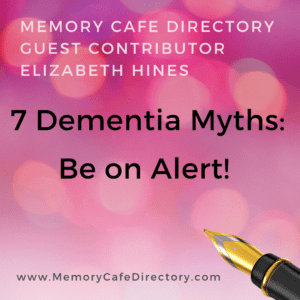Memory Cafe Directory posts and/or links to retailers can be advertising, sponsored, or affiliate links. We may earn a small commission from them. Thank you.
7 Dementia Myths: Be on Alert
Submitted by Guest Contributor:
Elizabeth Hines
Dementia can be a debilitating thing that can happen to people at any time in their lives. It can affect someone in the following ways:
- Cloud someone’s thinking
- Damper their memories, AND
- Get in the way of daily activities
How bad is it?
Although, at first glance, dementia isn’t as severe as Alzheimer’s, it can still change someone’s life. With routines altered, and memories becoming fickle, people who suffer from dementia will see the toll that it would take on them.
According to the Centers for Disease Control and Prevention, an estimated 5.0 million adults (of at least 65 years of age) have dementia, as of 2014. That number is expected to grow to nearly 14 million by 2060.
But with that said, there have been misconceptions circulating about what dementia is, and what it can do to people. The good news is, this article will help you decipher the mystery of dementia by unmasking 7 of the most common myths about it. Before we begin, keep in mind that any inquiries or concerns about dementia should be brought to a doctor’s or physician’s attention, if you suspect that you or a loved one might be suffering from it.
Let’s jump right in!
7 Dementia Myths
Myth #1 Dementia Is The Same As Alzheimer’s
“Believe it or not, dementia is not exactly the same as Alzheimer’s disease,” says Olivia McEncroe, a health writer at Boomessays and Lia Help. “In fact, the term ‘dementia’ is an umbrella term that describes symptoms that occur whenever there are dysfunctional brain cells in a patient.”
According to the Alzheimer’s Association, symptoms of dementia consist of the following:
- Memory loss (varies in individuals)
- Problems with short-term memory
- Keeping track of things
- Forgetting to tend to responsibilities
- Remembering doctor appointments
- Traveling out of their neighborhood
“When seeing questionable symptoms in your loved one, that doesn’t always mean that they’re suffering from Alzheimer’s,” adds McEncroe. “Dementia has more to do with symptoms that could be hindering the daily and mental activities of patients. Alzheimer’s, on the other hand, is considered a common form of dementia, which accounts for memory loss and other serious cognitive issues that could be interfering with someone’s life.”
Visit the Dementia Map Glossary to learn more about Alzheimer’s Disease and many other terms related to dementia care.
Myth #2 Only Older People Are Vulnerable To Dementia
Not exactly.
While dementia is more likely to happen to people who are over 65 years of age, the truth is, younger people can be subject to dementia as well. This form of dementia is called young-onset (or early-onset.) Young-onset is a form of dementia that affects people who are younger than 65 years of age. Research suggests that the most affected age group for young-onset is between 30 and 60 years old.
Needless to say, we can’t rule out dementia for younger people. In fact, dementia can happen at almost any age.
Myth #3 Dementia Is Natural In Aging
While some people may get dementia at old age, others won’t be subject to the same fate. In fact, some people will still have energy and plenty of memories even in their 80s and 90s. So, it’s safe to say that dementia isn’t a normal part of aging. Dementia can happen for some people, while others may be in the clear.
Myth #4 People With Dementia Are Oblivious To Their Surroundings
While dementia can be hard on the brain, that doesn’t mean that the sufferer won’t know what’s going on around them. The truth is, a person with dementia can more or less understand the situation that they’re in, rather than express it.
With that said, if your loved one has dementia, you’ll need to directly communicate with them, rather than talk only to their family members or caregiver. Talking directly to the patient allows them to gather their thoughts before choosing to respond.
The key here is to be patient with a dementia patient, because of course, they’re aware of their surroundings despite their limitations.
Myth #5 Dementia Is Genetic
“Some people may believe that if one person in the family gets dementia, then they’ll be doomed to the same fate,” says Emily Borella, a healthcare worker and editor at State of writing and Paper Fellows. “However, that is false. Dementia doesn’t have a strong genetic link, meaning that if a family member has had it, then you won’t be guaranteed that diagnosis when you grow older.
As for Alzheimer’s disease, you might be at risk for getting it yourself as you grow older, if your past generation suffered from it. It’s an odd thing about Alzheimer’s, since it’s technically under the umbrella of dementia. The only risk factor that you can get from dementia is age.”
Myth #6 Memory Loss Is Always Linked To Dementia
The truth is, memory loss is not always a link to dementia. In fact, the following factors can contribute to memory loss:
- Depression
- Infections occurring from different parts of the body
- Stroke
- Deficiencies in vitamin intake
- Side effects from medications, AND
- Abnormalities in the thyroid
Plus, we’re all susceptible to forgetfulness during our lives. While it’s normal to forget once in a while, it’s not a real link to dementia, unless it’s recurring. When in doubt, consult a doctor to learn more about the warning signs of dementia.
For a free exercise to strengthen recall, visit Memory Joggers right here on Memory Cafe Directory. By completing each phrase, recall is strengthened by moving longer term memories into short term ones.
Myth #7 Life Won’t Be Meaningful Once You Have Dementia
Finally, there’s the long-time belief that life won’t be meaningful anymore once dementia hits you. Thankfully, that’s not true.
Believe it or not, many people with dementia still manage to live their lives. Despite their mental limitation, they’re still active and living life to the fullest.
Plus, there is a fear amongst sufferers that if a doctor was to diagnose them with dementia, that they will be restricted in what they do, and what they can’t do. Besides, who wants to give up driving, even at an old age? Again, while dementia affects some people, it won’t affect others. That about depends on the person.
So, instead of making plans to give up things like driving, hiking, walking to the grocery store, and so on, people with dementia can live as is. While it’s still true that people with dementia will have to make the necessary adjustments in their lives, that doesn’t mean that fun activities and pleasures have to be shafted for the sake of sheltering the patient whose only suffering from a mild case. In mild cases, no lifestyle changes are necessary.
This goes to show that dementia patients are like any other people, despite their limitations.
In short: Live and let live.
Conclusion
Ultimately, dementia should still be something to think about, when it comes to you or your loved ones. While this diagnosis may worry people, especially when it comes to age, that doesn’t mean that it’s a one-size-fits-all, or universal, diagnosis. In other words, some people may get it, while others won’t. So, you can never know if whether or not you or someone you know will end up with dementia.
While the unknown can scare people into believing the myths – especially the 7 that have been discussed in this article – it’s important to talk about these problems with a doctor and or clinical psychologist, if you feel that you or your loved one is showing signs of dementia. By speaking with a medical professional, you’ll be educated about dementia, rather than be stuck with misinformation on the matter.
If you suspect that you or your loved one has experienced symptoms of dementia, call to your doctor or consult a certified medical professional for more information. By knowing the facts now, you and your family will be better informed about dementia.

Elizabeth Hines
Elizabeth Hines
Elizabeth Hines is a writer and editor at UK Writings and Essay for sale. She is also a contributing writer for PhD thesis writing.
As a content writer, she writes articles about the latest tech and marketing trends, innovations, and strategies.
Become a Contributor!
 Do you want to be a Memory Cafe Directory contributor? If you have helpful information to share with our community, read about the guidelines, then get in touch to discuss what you have to offer.
Do you want to be a Memory Cafe Directory contributor? If you have helpful information to share with our community, read about the guidelines, then get in touch to discuss what you have to offer.
Thank you.




